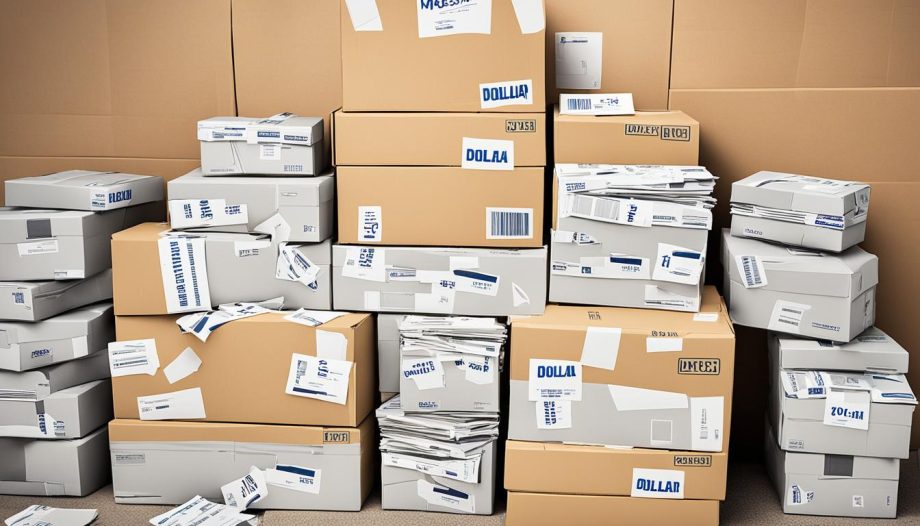Are you planning a move and wondering about the cost? Understanding the factors that influence the cost of moving is crucial for effective budgeting. In this section, we will explore these key factors so that you can plan your upcoming move and budget effectively.
Factors Affecting Moving Costs
The cost of moving can vary significantly depending on various factors. By understanding these key factors, you can better estimate and plan for the expenses associated with your upcoming move.
Let’s explore the main factors that influence the cost of your move:
1. Distance and Location
The distance you are moving and the locations involved play a crucial role in determining moving costs. Moving locally within a city is generally less expensive compared to long-distance moves between states or countries. Additionally, the cost can vary based on the accessibility of your current and new residence.
2. Size and Weight of Your Belongings
The size and weight of your belongings directly impact the cost of your move. Larger items and heavier loads require more effort and resources to transport, which can result in higher moving costs. It’s essential to accurately assess the volume and weight of your belongings to get an accurate cost estimation.
3. Additional Services and Special Items
Besides the basic moving services, additional services like packing, unpacking, and furniture disassembly can increase the overall cost. If you have special items such as pianos, antiques, or fragile belongings that require extra care during the move, it can also affect the moving costs.
4. Time of Year and Availability
The time of year you plan to move can have an impact on the cost. Peak moving seasons, such as summer, tend to have higher demand, which can result in higher prices. Additionally, the availability of moving services during specific periods can also affect the overall cost.
5. DIY vs. Hiring Professional Movers
Choosing between a DIY move and hiring professional movers is another significant factor. While a DIY move may seem cost-effective initially, it’s crucial to consider the time, effort, and potential risks involved. Hiring professional movers may provide convenience and ensure a smooth move, albeit at a higher cost.
Understanding these factors will assist you in estimating your moving costs effectively. By planning ahead and considering these variables, you can make informed decisions regarding your budget and ensure a successful, stress-free move.
| Factors | Impact on Moving Costs |
|---|---|
| Distance and Location | Increased distance and challenging locations can lead to higher costs. |
| Size and Weight of Belongings | Larger and heavier items require more labor and resources, resulting in higher costs. |
| Additional Services and Special Items | Services like packing, unpacking, and moving special items can add to the overall cost. |
| Time of Year and Availability | Peak moving seasons and limited availability can increase costs. |
| DIY vs. Hiring Professional Movers | Choosing to handle the move yourself or hiring professionals can impact the cost. |
Distance and Location
When it comes to moving, the distance of your move and the locations involved can have a significant impact on the overall cost. Whether you are moving locally or long distance, understanding how these factors influence moving costs is crucial for effective budgeting.
Moving Distance:
The distance you are moving plays a key role in determining the cost of your move. Generally, the longer the distance, the higher the moving cost. This is because longer distances require more fuel, time, and resources to transport your belongings to the new location.
When planning your move, consider the mileage and duration of the journey. If you are moving locally, the distance may be relatively shorter, resulting in lower costs compared to a long-distance move.
Location Impact:
In addition to the distance, the locations you are moving from and to also impact the moving costs. Moving from a bustling city center or a remote area can affect the accessibility and logistics involved in the move. These factors can influence the overall cost due to potential challenges in loading, unloading, and navigating through congested areas or difficult terrains.
Furthermore, the cost of living and labor rates in different locations can vary. Moving to a high-cost city or a remote destination might result in higher moving expenses than moving to a more affordable or well-connected area.
Considering the impact of distance and location on your moving costs is essential for accurate budgeting. By taking these factors into account, you can better estimate the total cost of your move and make informed decisions.
Moving Distance and Location Impact on Moving Costs
| Moving Locally | Moving Long Distance | |
|---|---|---|
| Distance | Shorter distance, lower costs | Longer distance, higher costs |
| Location | Accessibility and logistics impact costs | Cost of living and labor rates affect expenses |
As shown in the table, the distance and location of your move can have a significant impact on the overall moving costs. Understanding these factors will allow you to plan your budget effectively and make informed decisions throughout the moving process.
Size and Weight of Your Belongings
When it comes to estimating the cost of your move, the size and weight of your belongings are crucial factors to consider. The volume of items you have and their overall weight directly impact the moving cost. Let’s delve into how these factors affect your moving expenses and provide you with tips on accurately estimating the size and weight of your belongings.
To assess the size of your belongings, start by making an inventory of all the items you plan to move. Divide them into categories such as furniture, appliances, electronics, and personal belongings. This will give you a better understanding of the overall volume of your possessions. If possible, measure the dimensions of larger items to get a more accurate estimation of their size.
Pro Tip: To estimate the weight of your belongings, you can use a bathroom scale for smaller items or consult the manufacturer’s specifications for larger items like appliances. Keep in mind that professional movers will typically have their own methods for weighing your items, so the weight you estimate is only a rough approximation.
Keep in mind that moving companies use the size and weight of your belongings to determine the amount of space your items will occupy in the moving truck and the effort required to transport them. This calculation affects factors such as fuel consumption, labor costs, and the number of movers needed for your move.
Additionally, the size and weight of your belongings can also impact the type of equipment and supplies that will be necessary for your move. Larger and heavier items may require specialized equipment or additional labor, which can further affect the overall cost.
Tips for Estimating Size and Weight Accurately
- Measure the dimensions of your furniture and larger items to calculate their size.
- Consider the density of your items when estimating weight. Heavy items made of lighter materials may take up more space and require more effort to transport.
- When in doubt, consult with a professional moving company for guidance.
By taking the size and weight of your belongings into account when planning your move, you can ensure a more accurate cost estimation and prevent any surprises on moving day.
| Item | Dimensions (inches) | Weight (lbs) |
|---|---|---|
| Sofa | 84x36x30 | 120 |
| Dining Table | 72x36x30 | 80 |
| Television | 55 inches | 50 |
| Bed Frame | 60×80 | 70 |
| Boxes (10) | – | 200 |
Additional Services and Special Items
When planning a move, it’s important to consider all the additional services that may be required to ensure a smooth and successful transition. In addition to the basic moving services, there are several extras that can be beneficial to consider. These additional services can include packing, unpacking, and furniture disassembly. While they may increase the overall cost of your move, they can significantly reduce the time and effort required on your part.
Professional movers have the experience and expertise to efficiently pack your belongings, ensuring their safety during transit. They can provide high-quality packing materials and techniques to protect fragile items and maximize space in the moving truck. Not only does this save you time and stress, but it also minimizes the risk of damage to your valuable possessions.
Once you reach your new home, unpacking can be just as time-consuming and overwhelming as packing. Hiring professionals to handle unpacking will not only save you precious time but also ensure that your items are placed in their designated areas without any hassle.
Furniture disassembly and reassembly can be a tiresome task, especially if you have bulky or complex pieces. Professional movers have the necessary tools and expertise to disassemble and reassemble your furniture quickly and efficiently, preventing any damage or frustration during the process.
“Hiring professional movers to handle additional services such as packing, unpacking, and furniture disassembly can save you time, effort, and unnecessary stress during your move.” – [Real Name], Moving Expert at [Moving Company]
Furthermore, if you have special items such as pianos, antiques, or fragile belongings, it’s crucial to consider their unique moving requirements. These items often require extra care and precautions to ensure they remain undamaged during transportation.
Specialized piano movers have the expertise and equipment necessary to handle the intricacies of moving pianos safely. They understand the importance of proper packaging, securing piano legs, and navigating narrow spaces or stairs. By entrusting your piano to professionals, you can have peace of mind knowing it will be handled with the utmost care.
Antiques, artwork, and fragile items require special attention and protection during a move. Professional movers can provide custom packaging and handling techniques to safeguard these delicate items. They will take the necessary precautions, such as cushioning, wrapping, and positioning, to ensure their safe arrival at your new home.
Ultimately, investing in additional moving services and paying extra for the moving of special items is a worthwhile expense. It not only saves you time and effort but also provides you with the assurance that your belongings, especially delicate or sentimental ones, will be handled professionally and with care.
| Additional Moving Services | Cost Range |
|---|---|
| Packing Services | $200 – $800 (depending on the size of the home and amount of belongings) |
| Unpacking Services | $150 – $600 (depending on the size of the home and level of unpacking required) |
| Furniture Disassembly/Assembly | $100 – $400 (depending on the complexity and number of furniture pieces) |
| Piano Moving | $300 – $1,500 (depending on the type of piano and difficulty of the move) |
| Antiques and Fragile Items | Varies based on the specific items and their packing and handling requirements |
Time of Year and Availability
When it comes to planning your move, timing can play a significant role in your moving costs. The demand for moving services fluctuates throughout the year, with certain seasons being busier than others. If you have flexibility in choosing your moving date, it’s worth considering the impact of the time of year on your budget.
Moving during peak season, which typically includes the summer months and weekends, can lead to higher prices due to increased demand. Many families choose to move during the summer when school is out and the weather is favorable. As a result, moving companies are often in high demand, leading to limited availability and higher prices.
On the other hand, moving during non-peak seasons, such as winter or weekdays, can potentially save you money. During these times, moving companies may offer more competitive rates and have greater availability. However, it’s important to keep in mind the potential challenges associated with moving during the winter, such as weather conditions that could affect the logistics of your move.
To optimize your move based on availability and cost, consider the following tips:
- Plan your move well in advance, allowing ample time to secure your preferred moving date and negotiate better rates.
- Be flexible with your moving date and consider weekdays or off-peak seasons when the demand for moving services is lower.
- Book your movers as early as possible, especially if you are moving during the peak season.
- Communicate with your moving company to understand their availability and any potential discounts or promotions they may offer.
By considering the time of year and availability when planning your move, you can potentially save money and have a smoother experience. Keep in mind that while cost is an important consideration, it’s also essential to prioritize the reliability, reputation, and quality of the moving company you choose.
| Time of Year | Potential Impact on Moving Costs |
|---|---|
| Peak Season (Summer, Weekends) | Higher demand, limited availability, and potentially higher prices |
| Non-Peak Seasons (Winter, Weekdays) | Potential for lower prices, more competitive rates, and greater availability |
DIY vs. Hiring Professional Movers
When it comes to moving, one of the biggest decisions you’ll face is whether to take on the task yourself or hire professional movers. This decision can have a significant impact on the overall cost of your move. Let’s take a closer look at the costs involved in each option to help you make an informed decision.
DIY Moving
If you choose to take the DIY route, you’ll be responsible for every aspect of the move. This includes packing your belongings, renting a moving truck, loading and unloading your items, and transporting everything to your new location. While the upfront cost of a DIY move may seem more budget-friendly, it’s essential to consider all the associated expenses.
- Truck Rental: Renting a moving truck can be an additional expense that varies depending on the size of the truck, the distance of the move, and the duration of the rental.
- Packing Materials: You’ll need to purchase packing supplies such as boxes, tape, bubble wrap, and protective padding.
- Insurance: Since you’ll be handling all the packing and transportation, you’ll need to consider obtaining insurance coverage for any potential damages or loss.
- Additional Help: If you require assistance with heavy lifting or packing, you may need to hire helpers, which can add to your overall costs.
- Time and Effort: It’s important to consider the time and effort required for a DIY move. Moving is physically demanding and can be time-consuming, especially if you’re juggling other responsibilities.
Hiring Professional Movers
Opting for professional movers can provide convenience and peace of mind, but it does come with a higher price tag. Professional moving companies offer a range of services, including packing, loading, transportation, and unloading. Here are some cost factors to consider:
- Service Packages: Moving companies typically offer various service packages, allowing you to choose the level of assistance you need. The more services you opt for, the higher the overall cost.
- Distance and Size: The distance of your move and the size of your home or belongings will impact the cost. Longer distances and larger homes require more time, resources, and manpower.
- Insurance Coverage: Most professional movers provide insurance coverage, giving you peace of mind in case of any damages or loss during the move. However, additional insurance options may come at an extra cost.
- Scheduling: The time of year and the availability of movers can affect pricing. Peak moving seasons often come with higher costs, as demand is higher.
Ultimately, the decision between a DIY move and hiring professional movers depends on your specific needs, budget, and personal preference. Consider the time, effort, and financial resources you have available, and weigh the pros and cons of each option carefully.

By making an informed choice and adequately preparing, you can ensure a smooth and cost-effective moving process that meets your unique requirements.
Tips to Save on Moving Costs
If you’re planning a move, you’re probably looking for ways to save on your moving costs. Fortunately, there are several budget-friendly strategies you can implement to ensure a smooth and affordable move. By following these tips, you can keep your expenses in check and make the most of your moving budget.
1. Declutter and Donate
Before you start packing, take the time to declutter your belongings. Sort through your items and identify things you no longer need or use. Consider donating these items to charity or hosting a garage sale to earn some extra cash. The less you have to move, the lower your moving costs will be.
2. Pack and Label Your Boxes Yourself
Hiring professional packers can significantly increase your moving costs. Instead, opt to pack your belongings yourself. Take the time to properly label each box, indicating its contents and the room it belongs to. This will make the unpacking process much more efficient and save you time and money.
3. Compare Moving Quotes
Don’t settle for the first moving company you come across. Take the time to research and compare multiple moving quotes. Look for reputable moving companies that offer competitive pricing and quality services. By getting multiple quotes, you’ll be able to find the best deal and potentially negotiate for a lower price.
4. Opt for Off-Peak Moving Dates
The time of year and day you choose to move can impact your moving costs. Moving during peak seasons, such as summer or weekends, typically costs more. Consider scheduling your move during off-peak periods to take advantage of lower rates. Additionally, booking your move in advance can help you secure better prices.
5. Use Free or Discounted Moving Supplies
Rather than purchasing expensive moving supplies, look for ways to obtain them for free or at a discounted price. Ask friends and family if they have any boxes or packing materials to spare. You can also check with local businesses, such as grocery stores or liquor stores, as they often have spare boxes available for free.
6. Hire a Partial or DIY Moving Service
If hiring professional movers is outside your budget, consider alternative options. Partial service movers allow you to handle some aspects of the move yourself, such as packing and unpacking, while they take care of transportation. Alternatively, you can opt for a DIY move where you rent a truck and handle the entire process yourself.
7. Take Advantage of Tax Deductions
Check with your tax advisor to see if you qualify for any moving-related tax deductions. If you’re moving for a job, some expenses may be deductible, such as transportation costs or storage fees. Make sure to keep all relevant receipts and documentation to support your claim.
8. Plan Ahead and Stay Organized
Proper planning and organization can help you avoid unnecessary costs during your move. Create a detailed moving checklist and stick to it. Map out the logistics of your move, including the route and any required permits. By staying organized, you can prevent any last-minute expenses or delays.
9. Ask for Help
If you have friends or family members willing to lend a hand, don’t hesitate to ask for their help. Moving can be a physically demanding task, and having extra hands can make a significant difference. Be sure to show your appreciation by providing refreshments or a small token of gratitude.
By implementing these tips, you can save on your moving costs without compromising the quality of your move. With proper planning, organization, and a little creativity, you can have a budget-friendly and successful moving experience.
Planning and Budgeting for Your Move
To ensure a stress-free moving process, proper planning and budgeting are essential. By following a systematic approach and considering all necessary expenses, you can create a realistic moving budget and effectively plan for your upcoming move.
1. Assess Your Moving Needs
Start by assessing your moving needs to determine the scope of your move and the services you require. Consider factors such as:
- The size of your current home and the new home
- The distance you will be moving
- The number of rooms and furniture that need to be transported
- If you require additional services like packing, unpacking, or storage
2. Research Moving Costs
Research and gather information on the average moving costs within your area and for the specific services you will require. Use online resources, consult with professional moving companies, and ask for recommendations from friends and family who have recently moved.
3. Create a Moving Budget
Once you have a clear understanding of your moving needs and the associated costs, create a comprehensive moving budget. Factor in all expenses, including:
- Cost of hiring professional movers or renting a moving truck
- Packing materials and supplies
- Insurance and liability coverage
- Travel expenses
- Temporary storage, if needed
Allocate funds for unexpected expenses or contingencies as well. Use a spreadsheet or online budgeting tool to keep track of your budget and expenses.
4. Obtain Moving Quotes
Reach out to multiple moving companies and request detailed moving quotes. Ensure that the quotes include a breakdown of all costs and services provided. Use these quotes to compare prices and choose a moving company that fits your budget and requirements.
5. Declutter and Downsize
Prior to moving, take the opportunity to declutter and downsize your belongings. Sell or donate items that you no longer need or use. This will not only reduce the volume of items you need to move but also potentially save on packing materials and transportation costs.
Creating a realistic moving budget and planning effectively will help you ensure a smooth and affordable move. By considering your specific needs, researching costs, and obtaining accurate quotes, you can make informed decisions and avoid financial surprises along the way.
| Expense | Estimated Cost |
|---|---|
| Hiring professional movers | $XXX – $XXX |
| Moving truck rental | $XXX – $XXX |
| Packing materials and supplies | $XXX – $XXX |
| Insurance and liability coverage | $XXX – $XXX |
| Travel expenses | $XXX – $XXX |
| Temporary storage, if needed | $XXX – $XXX |
| Unexpected expenses/contingencies | $XXX – $XXX |
Getting Moving Quotes and Comparing Prices
When planning a move, it’s essential to obtain multiple moving quotes and compare prices to ensure you get the best deal. By doing so, you can make an informed decision and potentially save money on your move. Here, we will discuss the process of requesting accurate moving quotes and provide tips on comparing prices effectively.
Requesting Accurate Moving Quotes
The first step in getting accurate moving quotes is to provide detailed information about your move. Start by creating an inventory of all the items you plan to move. Include specific details such as the number of boxes, furniture pieces, appliances, and any special items like pianos or fragile belongings. This inventory will help moving companies understand the scope of your move and provide accurate estimates.
Next, reach out to reputable moving companies and request quotes. You can do this by visiting their websites, calling their customer service, or using online tools that allow you to request quotes from multiple movers at once. Be sure to provide the same information and inventory to each company to ensure consistent estimates.
While obtaining quotes, ask the moving companies to include any extra services you may require, such as packing, unpacking, or storage. This will give you a complete understanding of the potential costs involved.
Tips for Comparing Prices
Once you have received multiple moving quotes, it’s time to compare them and choose the best option for your budget. Here are some tips to help you compare prices effectively:
- Consider the complete package: Look beyond the initial cost and consider the services offered by each moving company. A slightly higher price may be worth it if a company provides additional services or has better reviews and reputations.
- Take note of any extra fees: Some moving companies may include additional fees in their quotes. Pay attention to these fees, such as fuel charges, stairs fees, or extra labor costs. Comparing the quotes side by side will help you identify any hidden charges.
- Check insurance coverage: Moving insurance is crucial to protect your belongings during transit. Compare the insurance coverage offered by different movers and ensure it aligns with your needs.
- Read reviews and testimonials: Online reviews and customer testimonials can provide valuable insights into the quality of service offered by each moving company. Take the time to read reviews and consider the experiences of past customers.
By following these tips and carefully comparing the moving quotes, you can make an informed decision and choose a reputable moving company that offers competitive pricing and meets your specific requirements.
Remember that the cheapest quote is not always the best choice. Consider the overall value, services offered, and reputation of the moving company. With proper research and comparison, you can find a reliable mover that provides quality service at a reasonable price.

Final Thoughts on Moving Costs
As we wrap up this article on moving costs, it’s important to reflect on the key points discussed. Understanding the factors that influence moving costs is crucial for budgeting effectively. By considering these factors and implementing our cost-saving tips, you can ensure a successful and affordable move.
First and foremost, the distance and location of your move play a significant role in determining the cost. Moving locally is generally more affordable compared to long-distance moves. Additionally, the size and weight of your belongings impact the overall cost. Estimating the size and weight accurately will help you budget more effectively.
It’s also important to consider any additional services you may require. Packing, unpacking, and furniture disassembly services can add to the overall cost. Moreover, moving during peak seasons can increase prices due to high demand, so timing your move carefully can help you save.
Lastly, you have the option to choose between a DIY move or hiring professional movers. While DIY moves may seem cost-effective initially, they can involve hidden expenses and challenges. Comparing the costs and benefits of each option will help you make an informed decision that aligns with your budget and requirements.
In conclusion, by understanding the factors that affect moving costs and implementing our cost-saving tips, you can budget effectively for your move. Whether you’re relocating across town or to a different state, careful planning and budgeting can lead to a smooth and financially manageable moving experience.




